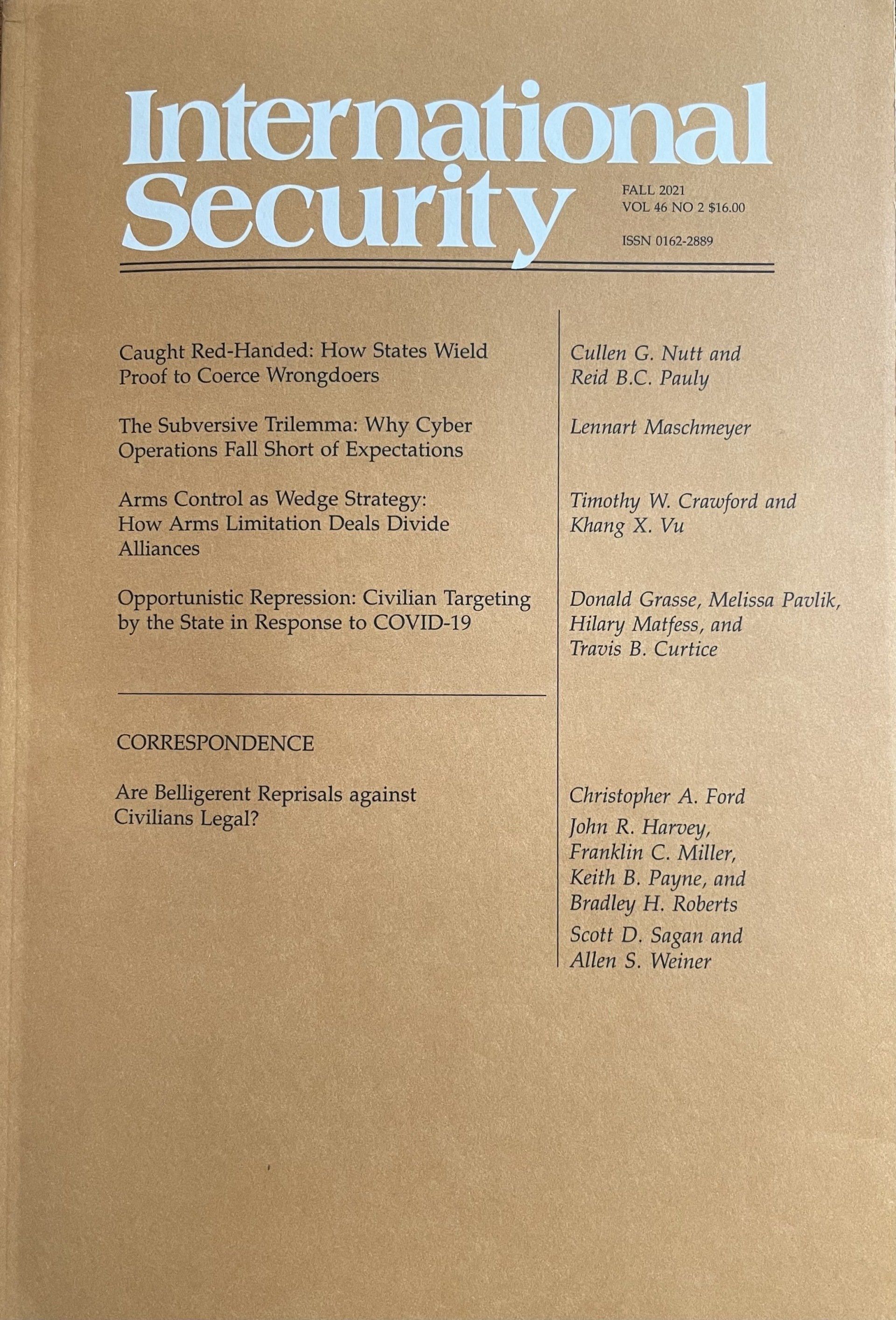Are Belligerent Reprisals against Civilians Legal?
In the Fall 2021 issue of International Security (vol.46, no.2) -- a peer-reviewed journal edited by Harvard's Belfer Center and published by MIT Press -- Dr. Ford responds to a legal argument made by Professor Scott Sagan and Mr. Alan Weiner in the Spring 2021 issue (vol.45, no.4). The issue is paywalled, but you can access the IS website here. A brief description of the controversy is provided below.

The traditional Law of Armed Conflict (LOAC) doctrine of reprisal (a.k.a. "belligerent reprisal") is a controversial one.
Defined as extreme measures of coercion that are used to help enforce the law of war by seeking to persuade an adversary to cease violations, reprisals are undertaken in order to persuade another belligerent to stop violating the LOAC (a.k.a. International Humanitarian Law). If reprisal is undertaken for that purpose -- and only under other carefully-defined circumstances (e.g., they must be specifically announced as such, cannot be undertaken against categories of persons or objects that are expressly protected by an applicable treaty, are subject to the doctrine of proportionality, and cannot continue after the enemy has ceased the LOAC violation or violations it is the purpose of reprisal to end) -- reprisal doctrine permits a belligerent to undertake actions that would otherwise be unlawful. (The interested reader can find this laid out, for instance, on pages 1010-16 of the U.S. Defense Department's Law of War Manual, but the doctrine is an old one in international law.)
Because this doctrine permits actions that would -- if undertaken for different reasons or under different circumstances -- constitute serious war crimes, it has been the subject of much criticism from those who would change this rule. It has also sometimes been attacked by academics and lawyers who have confused lex lata (what the law actually is) with lex ferenda (what they feel the law should be).
As described above, traditional LOAC doctrine would permit reprisals against civilians. The First Additional Protocol to the Geneva Conventions of 1949 negotiated in 1977 (a.k.a. "AP I"), however, specifically prohibits civilian reprisals. Yet the United States declined to ratify AP I, objecting among other things to its stance on reprisals, arguing that reprisal doctrine is a tool that could help enforce the LOAC, and that renouncing it would "remove[] a significant deterrent that presently protects civilians and other war victims on all sides of a conflict." (Incidentally, Britain, France, Germany, Italy, and Egypt also voiced objections.)
This is not the place to debate lex ferenda. But in the Spring 2021 issue of International Security, Stanford Professor Scott Sagan and Stanford Law School Lecturer Alan Weiner argued that AP I's prohibition on reprisals had become binding upon the United States -- that is, that lex lata had come to apply to us -- because AP I's rule had become customary international law and the United States' prior objections to the reprisal prohibition had been retracted. Specifically, on pages 129-30 and 157-60 of their original article, Sagan and Weiner contended that the United States has now become bound by AP I because "the legal landscape has changed." Indeed, they alleged that it was not only the case that Washington "cannot point to a record of persistent objection" to the reprisal ban, but that the United States had effectively withdrawn its prior reservations.
My response to this argument appeared in the Fall 2021 edition of International Security.
By way of full disclosure: I don't really know Alan Weiner, but I've known Scott Sagan for years, and consider him a friend. Indeed, Scott taught me my first class on strategy and nuclear issues when he was at the Kennedy School and I was an undergraduate at Harvard many years ago -- though he may now regret it. (We don't seem to agree much about nuclear weapons-related matters.)
In my response, I took no position on what the law should be (lex ferenda), but I did try to set the record straight about lex lata. Specifically, I pointed out that the statements by U.S. officials upon which Sagan and Weiner had relied to demonstrate U.S. acceptance of AP I's reprisal rule not only contained no legal views but in fact actually preceded the U.S. Government's explanation of its objections to that rule, and thus couldn't possibly represent any sort of retraction. (Even if the quoted statements had somehow expressed legal views, after all, you can't withdraw an expression of opinion you haven't made yet!)
I also pointed out that U.S. Government publications have subsequently been quite clear about the survival of traditional doctrine on reprisal in U.S. interpretations of the LOAC, undermining the Sagan/Weiner argument that the American position against AP I's reprisal provision has not been consistently maintained over time. The illustrative example I gave in my letter to IS was the U.S. Army's Law of War Deskbook, but the interested reader can easily find many others. The U.S. Army's Operational Law Handbook, for instance, recounts traditional reprisal concepts in every edition that has been published and made available online since 2001. You can find all 13 of these documents here, conveniently collected and made available by the Library of Congress. (The 2021 edition follows this same pattern, but does not appear to be available online yet.)
As I pointed out in concluding my response in the Fall 2021 issue, "[b]ecause states are presumed not to be bound by international law until some rule has clearly come into being, the burden of proof is on those who would claim that state practice and opinio juris have created a new rule. Sagan and Weiner fail to carry this burden."
Sagan and Weiner have responded to my argument by quietly stepping away from their own prior reliance upon the significance of statements by U.S. officials supposedly indicating American second-thoughts about objecting to AP I. Forgetting their own prior concession (p.159 of their first article) that "[t]here is no precise formula on how persistently a would-be persistent objector must object to an emerging rule," they now simply assert that the United States never really objected to the new standard in the first place -- with the result, allegedly, that AP I has become customary international law and is binding upon the United States notwithstanding the clear objections made at the time and referenced thereafter.
(Apparently unaware of the numerous U.S. Government legal publications that recount traditional LOAC reprisal principals as being the law, they also sniffed that in my commentary I had merely cited "one (and only one)" example of such a publication. I hope that my hyperlink to the Library of Congress will thus help them with their future legal research.)
Sagan and Weiner also attempt to depict official U.S. nuclear weapons employment guidance as reflecting an AP I-style understanding of the law. That, however, reads far too much into the policy documents in question. It is certainly true, as the reader can see in both President Obama's 2013 guidance and President Trump's 2020 guidance, that the United States has committed itself to compliance with the laws of war, and has made clear that it "will not intentionally target civilian populations." But what it actually means to commit oneself to compliance with the LOAC depends upon what that law actually is, which those documents do not set forth. And it is unquestionably the legal default -- and hence an utterly unsurprising doctrinal statement -- that one should not intentionally target civilian populations.
Yet merely to say this much is to say essentially nothing about reprisal doctrine. The whole point of reprisal doctrine, after all, is that such actions would only be lawful if undertaken (a) in response to an adversary's LOAC violation and (b) purely in order to persuade the adversary to return to compliance with the law. Absent a wartime adversary's violation, reprisal doctrine simply isn't relevant, so of course the policy statements of U.S. employment guidance make no reference to it. (And one certainly hopes the issue will never arise!)
There's no point in trying to torture the 2013 and 2020 guidance statements for some implied exegetical pronouncement about AP I's reprisal rule, for nothing of the sort can be found there, one way or the other. If you want to know how the United States interprets reprisal doctrine, look to the many instances in which it has explicitly described its understanding of reprisal doctrine, including in actually training the operational lawyers it commendably assigns to operational commands at many levels, including targeting cells.
Anyway, if you're willing to navigate the IS paywall, you can read all these competing arguments for yourself. I hope you enjoy the legal wonkery!
-- Christopher Ford








